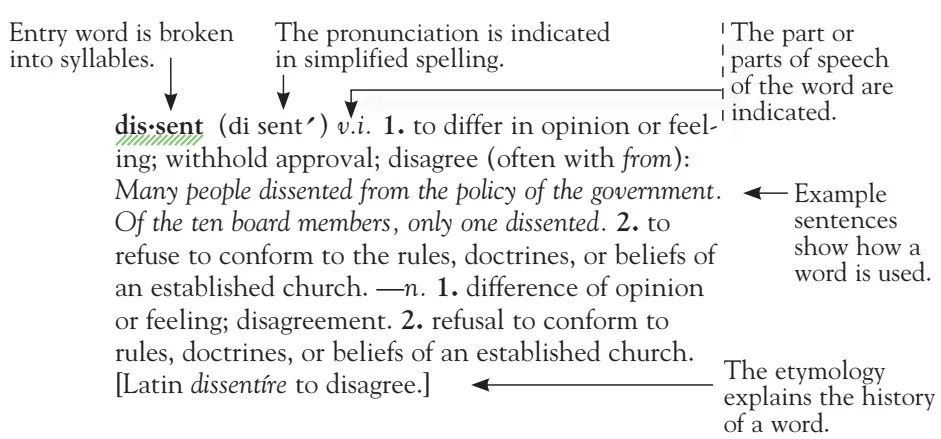Dictionary Use
Introduction
Have you ever stumbled upon a word in a book and wondered, "What does that mean?" Imagine holding the key to unlock the mysteries of language right in your hands. Welcome to the fascinating world of dictionary use!
Whether you’re a student aiming to excel in your studies, an educator guiding young minds, a writer honing your craft, or a language enthusiast seeking to broaden your vocabulary, mastering the art of dictionary use is essential. This article will explore the intricacies of dictionary entries, providing you with the tools to enhance your language skills and communication.
Learning Objectives
In this lesson, you will focus on the following objective: Understanding dictionary use.
Dictionary Use
“There were now loud murmurs of dissent among the chorus: ‘Na lie de man de lie; e get plenty money…’”
—Chinua Achebe, from “Civil Peace”
Literature Connection
In this scene from “Civil Peace,” thieves surround Jonathan’s house and demand payment. Their leader agrees to settle for twenty pounds. They are speaking in a Nigerian dialect. But there’s a standard English word that is key to this passage. What does dissent mean?
A dictionary can tell you.
- Find a Word
The main part of a dictionary consists of word entries and their definitions. - Look for guide words at the top of each page.
These tell you the first and last words listed on the page and can help you locate entries much more quickly than if you simply browse.
The Main Entry
A main entry tells you far more about a word than its definition. Here is what one dictionary says about dissent:
$$
Dictionary entries may also provide
- preferred spellings when alternate forms of words are acceptable
- inflected forms of the main entry word, such as plurals, adverbs, or adjectives
- cross references to synonyms and antonyms
- guidelines that show how a word is used in different contexts
Conclusion
In a world where words wield immense power, knowing how to effectively use a dictionary can be transformative. Whether you're deciphering complex passages, expanding your vocabulary, or refining your writing, dictionaries offer a wealth of knowledge waiting to be tapped. By mastering this skill, you not only improve your language proficiency but also empower yourself to communicate more effectively. So next time you encounter an unfamiliar word, remember that your dictionary is more than just a book—it's a gateway to a richer understanding and expression. Keep exploring, keep learning, and let the dictionary be your trusted companion in your linguistic journey.
FAQs
Q: Why are dictionaries important?
A: Dictionaries provide authoritative meanings and definitions of words, enabling shared understanding. They document language and usage.
Q: How can dictionaries help improve writing skills?
A: Looking up precise definitions, synonyms, parts of speech, and etymology improves vocabulary and style. Dictionaries aid grammar and syntax.
Q: What are the benefits of online vs. print dictionaries?
A: Online dictionaries offer enhanced search, multimedia, and updates. Print provides portability and focus without distractions.
Q: Should dictionary usage be taught in schools?
A: Yes, dictionary skills promote vocabulary growth, reading comprehension, accurate writing, and self-editing. Teaching dictionary use is foundational.
Q: What are some tips for effective dictionary use?
A: Know the entry structure. Check multiple dictionaries. Learn pronunciation guides. Verify meanings in context. Review examples.


